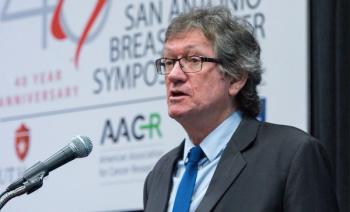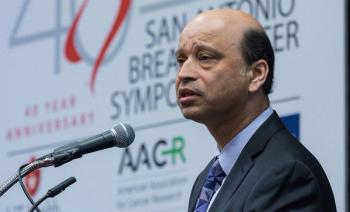
Increasing chemotherapy dose intensity reduced the risk of recurrence and death over standard chemotherapy regimens, according to a meta-analysis of women with early-stage breast cancer.

Your AI-Trained Oncology Knowledge Connection!


Increasing chemotherapy dose intensity reduced the risk of recurrence and death over standard chemotherapy regimens, according to a meta-analysis of women with early-stage breast cancer.

The addition of the CDK4/6 inhibitor ribociclib to endocrine therapy with either tamoxifen or an aromatase inhibitor significantly improved progression-free survival among premenopausal and perimenopausal women with breast cancer.

The combination of pembrolizumab and trastuzumab showed promising clinical benefit in patients with trastuzumab-resistant HER2-positive advanced breast cancer who express PD-L1, according to a new study.

A study found no difference in outcomes between 2 and 5 years of treatment with zoledronate after chemotherapy in early breast cancer patients, suggesting the longer duration may not be necessary.

A novel classification system that incorporates genomic risk with clinical variables was able to accurately identify prostate cancer patients at low, intermediate, and high risk for metastasis.

Traditional neoadjuvant chemotherapy along with dual HER2-targeted blockade yielded significantly better response rates than a novel approach using HER2-targeted chemotherapy plus HER2-targeted blockade, according to a randomized phase III trial.

An intermittent schedule with extended adjuvant letrozole did not improve disease-free survival in postmenopausal breast cancer patients.

A 5-year follow-up analysis showed that 1 year of extended adjuvant therapy with neratinib, given after chemotherapy and trastuzumab, can significantly improve rates of clinically relevant relapses in women with HER2-positive breast cancer.

The LMWH enoxaparin failed to improve overall or progression-free survival in small-cell lung cancer patients, in spite of improved rates of venous thromboembolism.

Duloxetine resulted in reduced AI-associated musculoskeletal symptoms compared with placebo in women with early-stage breast cancer.

The addition of bevacizumab to adjuvant chemotherapy failed to improve survival outcomes in patients with surgically resected early-stage NSCLC.

The FDA has granted approval for the use of dasatinib (Sprycel) in pediatric patients with Philadelphia chromosome–positive chronic myeloid leukemia in the chronic phase.

The GPNMB-targeted agent known as glembatumumab vedotin was reasonably well tolerated and showed some activity in a phase II study of recurrent/refractory osteosarcoma, but this activity was not enough to continue the drug’s evaluation in this setting based on the study protocol.

An analysis of more than 800 patients found that the one-size-fits-all approach to “aftercare” for localized soft-tissue sarcoma is misguided. Local recurrence and distant metastasis occur in a non-constant fashion in the years after treatment, and a time- and risk-adapted strategy for aftercare is warranted.

Treatment with hyperthermia improved survival when added to neoadjuvant chemotherapy for patients with localized high-risk soft-tissue sarcoma.

Lurbinectedin demonstrated clear antitumor activity as a single agent in patients with advanced or relapsed Ewing sarcoma, according to results of a phase II trial.

An intense dose-dense chemotherapy approach offers better survival vs standard therapy, extending to 10 years in breast cancer patients with extensive lymph nodes.

The first phase II study of cabozantinib in soft-tissue sarcoma yielded several responses, including several subtypes such as alveolar soft-part sarcoma and myxoid liposarcoma.

The combination of durvalumab and tremelimumab offered a modest response rate in unselected patients with heavily pretreated metastatic sarcoma, but higher rates were seen in specific subtypes, including angiosarcoma and alveolar soft-part sarcoma.

NY-ESO-1 SPEAR T-cell therapy showed promising results and was reasonably safe in patients with synovial sarcoma, according to a new study. The addition of fludarabine may be important to achieving those positive results.

Adding trastuzumab to anthracycline and taxane-based chemotherapy does not result in worsening of long-term cardiac outcomes in patients with node-positive, HER2-positive early breast cancer, according to a new study.

Isolated limb perfusion with high-dose melphalan and TNF-alpha has a high response rate and results in good survival outcomes in patients with locally advanced angiosarcoma, according to results of a new study.

The combination of axitinib and pembrolizumab was reasonably well tolerated and showed promising activity in patients with various subtypes of soft-tissue sarcoma, with the benefit seen primarily in those with alveolar soft-part sarcoma, according to a new study.

The EZH2 inhibitor tazemetostat has shown good activity and is very well tolerated in an analysis of three trials of patients with the rare sarcoma subtype known as epithelioid sarcoma.

The immune checkpoint inhibitor pembrolizumab demonstrated antitumor activity in a small trial of patients with advanced cervical cancer. The agent had a similar toxicity profile to that seen in other malignancies.

Men with Medicaid are more likely to present with metastatic prostate cancer than men presenting with prostate cancer who have private insurance, according to a new study. There are racial disparities in terms of prostate cancer outcomes among those privately insured, but not among Medicaid recipients.

Novartis has submitted an application to the FDA to extend the indications for its CAR T-cell therapy tisagenlecleucel (Kymriah) for its use in adult patients with relapsed or refractory diffuse large B-cell lymphoma who are not eligible for autologous stem cell transplant.

Achievement of event-free survival at 24 months is highly predictive of overall survival in patients with peripheral T-cell lymphomas, according to a new study.

A novel risk classification scheme based on expression of 36 micro-RNA samples was able to identify pediatric patients with acute myeloid leukemia at high or low risk of experiencing treatment failure, according to a new analysis.

An analysis of treatment patterns found that patients with advanced urinary tract cancer who are eligible for cisplatin-based chemotherapy fare better when they do receive such regimens than when they do not, highlighting the importance of following published treatment criteria.